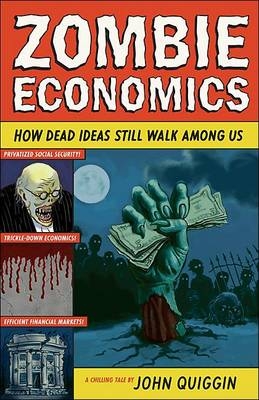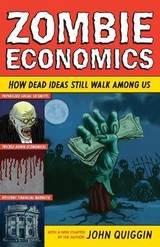
Zombie Economics
Princeton University Press (Verlag)
978-0-691-14582-2 (ISBN)
- Titel erscheint in neuer Auflage
- Artikel merken
In the graveyard of economic ideology, dead ideas still stalk the land. The recent financial crisis laid bare many of the assumptions behind market liberalism - the theory that market-based solutions are always best, regardless of the problem. For decades, their advocates dominated mainstream economics, and their influence created a system where an unthinking faith in markets led many to view speculative investments as fundamentally safe. The crisis seemed to have killed off these ideas, but they still live on in the minds of many - members of the public, commentators, politicians, economists, and even those charged with cleaning up the mess. In "Zombie Economics", John Quiggin explains how these dead ideas still walk among us - and why we must find a way to kill them once and for all if we are to avoid an even bigger financial crisis in the future. "Zombie Economics" takes the reader through the origins, consequences, and implosion of a system of ideas whose time has come and gone.
These beliefs - that deregulation had conquered the financial cycle, that markets were always the best judge of value, that policies designed to benefit the rich made everyone better off - brought us to the brink of disaster once before, and their persistent hold on many threatens to do so again. Because these ideas will never die unless there is an alternative, "Zombie Economics" also looks ahead at what could replace market liberalism, arguing that a simple return to traditional Keynesian economics and the politics of the welfare state will not be enough - either to kill dead ideas, or prevent future crises.
John Quiggin is professor of economics at the University of Queensland in Australia.
Preface vii Introduction 1 Chapter 1: The Great Moderation 5 Birth: Calm after the Storms 8 Life: The Great Risk Shift 13 Death: The Dissenters and Their Vindication 19 Reanimation: A Global Crisis or a Transitory Blip? 30 After the Zombies: Rethinking the Experience of the Twentieth Century 31 Further Reading 34 Chapter 2: The Efficient Markets Hypothesis 35 Birth: From Casino to Calculating Machine 36 Life: Black-Scholes, Bankers, and Bubbles 39 Death: The Crisis of 2008 50 Reanimation: Chicago Revives the Dead 64 After the Zombies: The State and the Market 66 Further Reading 77 Chapter 3: Dynamic Stochastic General Equili brium 79 Birth: From the Phillips Curve to the NAIRU, and Beyond 83 Life: Rationality and the Representative Agent 106 Death: How Did Economists Get It So Wrong? 110 Reanimation: How Obama Caused the Global Financial Crisis 121 After the Zombies: Toward a Realistic Macroeconomics 123 Further Reading 133 Chapter 4: Trickle -down Economics 136 Birth: From Supply-side Economics to Dynamic Scoring 138 Life: Excuses for Inequality 146 Death: The Rich Get Richer and the Poor Go Nowhere 152 Reanimation: Mobility without Movement 167 After the Zombies: Economics, Inequality, and Equity 168 Further Reading 172 Chapter 5: Privati zation 174 Birth: We Are All Market Liberals Now 178 Life: A Policy in Search of a Rationale 182 Death: Puzzles and Failures 187 Reanimation: Dead for Good? 199 After the Zombies: The Mixed Economy 200 Further Reading 204 Conclusion: Economics for the Twenty -first Century 206 Rethinking the Experience of the Twentieth Century 206 A New Approach to Risk and Uncertainty 207 What Is Needed in Economics 210 References 213 Index 229
| Zusatzinfo | 4 line illus. |
|---|---|
| Verlagsort | New Jersey |
| Sprache | englisch |
| Maße | 152 x 235 mm |
| Gewicht | 510 g |
| Themenwelt | Geschichte ► Teilgebiete der Geschichte ► Wirtschaftsgeschichte |
| Wirtschaft ► Allgemeines / Lexika | |
| Wirtschaft ► Volkswirtschaftslehre | |
| ISBN-10 | 0-691-14582-2 / 0691145822 |
| ISBN-13 | 978-0-691-14582-2 / 9780691145822 |
| Zustand | Neuware |
| Haben Sie eine Frage zum Produkt? |
aus dem Bereich



